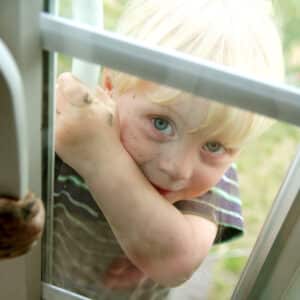Parenting sure has changed a lot since I was a kid, and most definitely since my parents were kids. Listening to my father tell stories from his childhood (he was born in 1950) leaves my mouth gaped open. Life was hard. Period. Physically, they had very, very little. I mean dirt floors at one point and a few homemade clothes.
Emotionally, their parents were surviving; so there was precious little left over to give their children, and the idea of helping them feel validated or affirming their feelings, or providing in any way over basic food and shelter was rare. My grandfather made my 10-year-old father shoot his longed-for and beloved horse when it broke its leg.
They grew up on grit.
Every time I hear a young adult begrudge his parents for some petty thing, imagined in his mind to be near-abusive, I shake my head and think of my mom and dad, who are well-adjusted adults with far greater contentment and sense of self-worth than many teenagers today, who underwent things I don’t wish on my enemies.
And while that was a bit random, I do enjoy thinking of the paradox of these things.
If you scroll the internet for “ways to raise happy kids” you’ll certainly find some helpful tips. But I wonder if some of them have backfired. Thinking about my parents’ generation, contrasted with today’s, seeing that the level of discontentment, self-inflicted harm, and in general, level of unhappiness seems even higher now, despite prosperity and a heightened awareness of parenting techniques, I want to offer some timeless ideas I have about how to raise happier kids.
Let them figure things out and become independent.
As kids grow older, they will either find a great sense of worth in being able to do things on their own and solve their own problems or become frustrated if they can’t. In our parent’s generation, they often had to fend for themselves and were given far greater responsibilities at earlier ages. But ironically, it seemed to breed a sense of worth and accomplishment that aided their emotional development. From a young age, when children are given appropriate challenges to figure out, they grow in independence and consequently, contentment.
RELATED: Teaching My Kids Grit by Modeling How To Fail Well
Let them go without.
The verdict is out: simply, kids who are given everything they want seem to become more discontent over time. If they get everything they desire, they tend to measure their happiness based on getting those things, and we all know the truth of that bottomless pit. Sometimes no is in order. Saying no initiates valuable lessons that will serve them well later in life. (This one is hard for me, as it is for all parents. But I have to remind myself of the irony, and practically speaking, we can’t provide their every wish anyway, so it works out.)
Let them earn money to buy their own things.
They not only appreciate them more, but it also builds confidence in their ability to solve a practical problem and equips them for grown-up life when we all realize that we actually do have to work for the things we want.
Talk about our reasons for gratitude.
I constantly remind my children about the need to consciously be thankful for things easy to take for granted. Even toddlers and younger children can participate in listing off things to be grateful for. Lots of mornings, I start the day discussing how a large percentage of the world’s population doesn’t enjoy the same freedoms, doesn’t always have plenty to eat, doesn’t always have a warm, cozy place to sleep, or parents, etc. Perspective is everything.
Work on unity with your spouse.
The stability of home life has a huge impact on children. If they feel like Mom and Dad are okay, mostly the world is okay. Kids of all age groups need this reassurance—show them that marriage requires teamwork.
Help them see their worth in the qualities that matter.
Praising them for their beauty or athletic ability is tempting, but it’s far better to point out what is inherently valuable about their character. Kindness, humility, gratitude—the things that really matter are what they need to hear make them special.
RELATED: 20 Affirmations for Girls Besides “You’re So Pretty”
Don’t go overboard on the feelings.
It seems to me that we have raised an overly sensitive generation where feelings are paramount. This seems to be one of the huge distinguishing factors from my parent’s generation. Feelings are valid, but feelings don’t need to rule. Sometimes, feelings just have to be pushed aside for the task at hand. Sometimes, I have to suppress what I feel in order to treat a person the way God has asked me to. Feelings can deceive, and feelings can exaggerate a situation. We need to find a good balance.
Remind them that keeping the needs of others in front of them has great personal reward.
Self-focus has a low return. Teach them to develop habits of humility. True contentment comes from putting others first, just as God knew when He commanded that we do it, having our best interest in mind. (Isn’t it cool that the command wasn’t just for others? It is for us as much.)
Like your kids.
That’s not the same as doting on them or giving them everything. In fact, liking them specifically means that sometimes you’ll say, with a smile, “Gosh, I hate that you’re mad at me about that, but look at me—I love you so much.” It’s a simple, profoundly effective means of raising happy kids. Cultivate a relationship with them. Eat around the table together. Ask questions. Hug them. Smile at them. Children who are liked have a much higher chance of being happy.
I don’t think it’s rocket science, and I think parents are inherently equipped to raise healthy, happy children when they don’t read too much or give in too much to peer pressure. Here’s to parenting: it isn’t that hard.
Originally published on the author’s blog

If you liked this, you'll love our book, SO GOD MADE A MOTHER available now!
Order NowCheck out our new Keepsake Companion Journal that pairs with our So God Made a Mother book!
Order Now
















